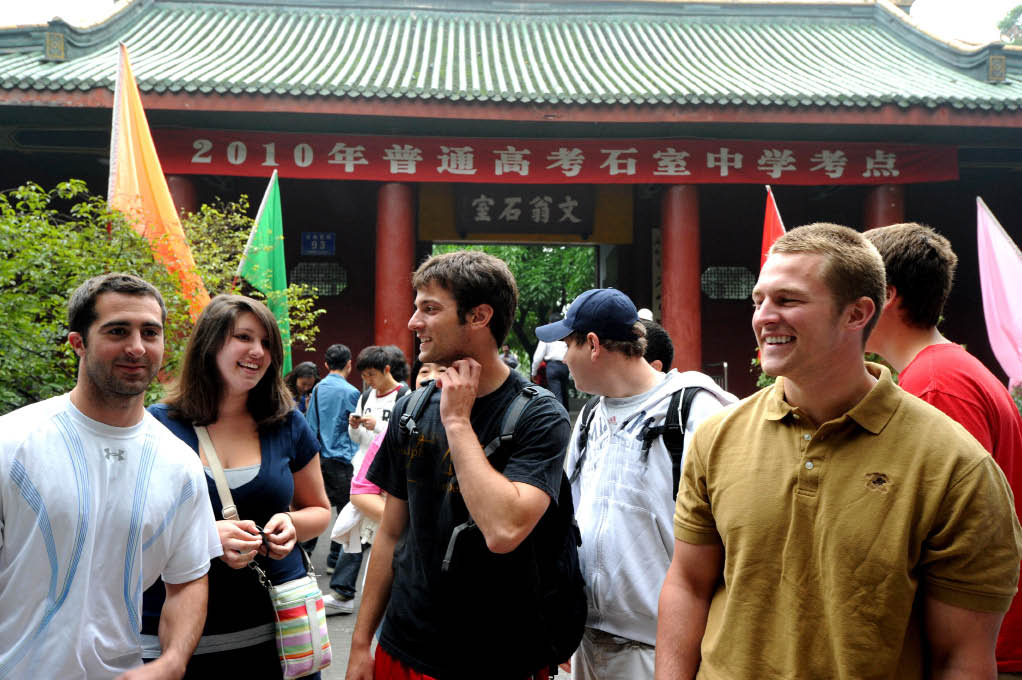|
 |
|
University of Miami sophomores peep into Shishi Middle School in Chengdu City during national college entrance exams at spring term's end. Photos by China Foto Press | With China emerging ever more powerful on the international and economic scene the U.S. is serious about the professional preparation of the next generation of China communicators. Spending time in China, learning Chinese and making personal connections with citizens is an ideal way to educate the Americans who will someday officially represent their government, the academics who will advise domestic policy makers, and the industry leaders who will shape international policy and trade relations.
In January 2011, when President Hu Jintao visited the U.S., the two nations reaffirmed their commitment to enhance people-to-people engagement through educational exchanges. "It is clear that virtually no global challenge can be met without U.S.-China cooperation," said Carola McGiffert, director of the 100,000 Strong Initiative.
Just as the U.S. welcomed Chinese students so long ago, the Chinese have opened their educational facilities to participating Americans. The Chinese government had already supplied 10,000 Bridge Scholarships for Americans studying in China when at the U.S.-China Consultation on People to People Exchange held in Washington D.C in April 2011, State Councilor Liu Yandong announced an additional 10,000 bridge scholarships would be given out. These scholarships will assist U.S. high school and college graduates, teachers and school administrators in traveling to China over the next four years to teach, operate schools and educate themselves.
Growth in study abroad programs in China has been very apparent in recent years, without orchestrated government stimulation and even before the launch of the 100,000 Strong Initiative. Americans are simply taking more notice of China. The number of U.S. students studying here grew by 30 percent annually from 2001 to 2007, and continues to rise. In the 2007-08 school year, for example, 13,165 American college students and an estimated 1,000 high school students went to China for some type of study program, according to the U.S. Embassy in China website.
These impressive growth figures are perhaps partially explained by a deepening of interest in China and Chinese culture in America. It may have begun with specific elements like Taiji, Buddhism, and Chinese fashion, music, cinema and art, but the number of American students knuckling down to learn Mandarin Chinese has tripled in recent years, according to the American Council on the Teaching of Foreign Languages. More American students are recognizing the importance of an international education, with China as a critical region strategically and economically.
"The beautiful spring of China-U.S. people-to-people exchanges has arrived," said Liu.
Conversely there are programs underway to help Americans who have studied in China use their newly gained knowledge back home. The Golden Bridges Foundation, a non-profit organization aimed at facilitating positive Sino-U.S. relations, announced the May 9th launch of Project Pengyou(friends) to harness the power of Americans who have studied in China. Part of the 100,000 Strong Initiative as an autonomous private sector support network, Project Pengyou gives alumni of the 100,000 Strong Initiative a forum for networking, support and shared experiences. Since some participants will be graduating this year, the project aims at harnessing their skills and knowledge in an online forum for jobs, career advice and networking. "We help (returned students) continue their engagement in China-U.S. relations," says Holly Chang, CEO of Golden Bridges. The launch of the site coincided with the official U.S.-China Strategic & Economic Dialogues held in May, 2011.
Secretary of State Hillary Clinton cited individual exposure and education as the keystone for bridging gaps and bettering Sino-U.S. relations. Liu agrees: "People-to-people exchanges are a bridge for understanding and trust between nations and between peoples."
LAUREN JOHNSON is a freelance writer based in Beijing. Ms Johnson has a Master's degree in Asian history, and specializes in China-U.S. relations.
|
